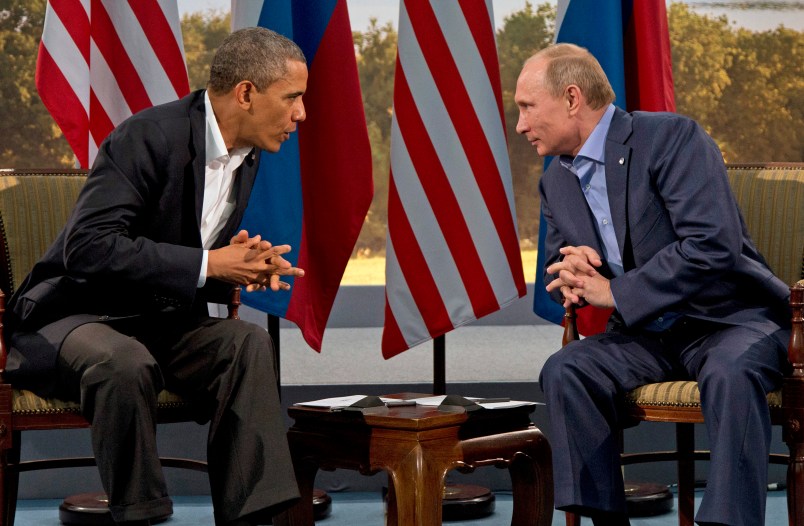Do you remember when President Bush’s political adversaries starting ragging on him during the first days after 9/11? Or during the first days of the invasion of Iraq? Me neither. Whatever you think of the holder of the presidential office, if you are actually concerned about the nation’s welfare you don’t go on TV mocking him and saying he’s weak.
The Syria debacle was the low point of President Obama’s presidency in the foreign policy realm – not because he didn’t use force but because he needlessly boxed himself in with his “red line” talk and then had to climb down from his imprudent threat because getting involved in the Syria Civil War is such a bad idea. The White House has some argument that the threat of force secured a deal to eliminate Syria’s chemical weapons stockpiles. But it may have been luck as much as anything.
The more relevant point is that, as Peter Beinart explains here, nothing that happened in Syria encouraged or frankly had anything to do with Putin’s decision to occupy Crimea.
What I’m struck by, however, is the odd mix of fear and wish projection with which many conservatives view Putin. We hear how dangerous Putin is but also pretty clearly that they wish our leaders were like him – someone who bends history to his will and all that. I mentioned earlier that for all the carping about how President Obama encouraged Putin’s aggression and hasn’t responded to it with sufficient force – what about what happened in Georgia in 2008? President Bush did basically nothing. The truth is there was very little he could do.
The President’s critics talk about “resolve” and “leadership” and “toughness” because there are not any actual actions they can point to that they think he should do but isn’t. These phrases are plastic, can mean anything and can be puffed up with all manner of wish-projection and foreign policy fantasy untethered to any concrete and specifics actions. It recalls the glory days of #RomneyStrength.
It’s really that clear. Vague and ambiguous phrases are used to conceal this.
What President Obama could do is give Putin an ultimatum to leave Crimea or be forcibly expelled. Then we’d have a real test of strength and Putin would see deep potential costs to his actions. But even the President’s toughest critics recognize this would be insane. It’s really not a good idea to get into a land war with the world’s other major nuclear power on their own terrain. (And whatever we think of the relationship between Russia and Ukraine now they were part of a single country for centuries and in terms of experience, tactics and knowledge it’s home ground for the Russian Army.)
Russia is not ‘on the march’. It is trying to assert dominance over countries on its immediate borders whereas it used to have that control to the borders of Western Europe. We’ve extended our military alliance to or almost to its borders. Russia is ringed by NATO members the US is treaty bound to defend – Poland and the Baltic State being now the diciest and most dangerous places where that promise has been applied.
This is a big crisis for US foreign policy and President Obama meets it at an inauspicious moment. But if you’re hearing macho wish projection and not terribly well concealed Putin-envy rather than clear demands for tangibly different policies and actions, there’s a reason.






